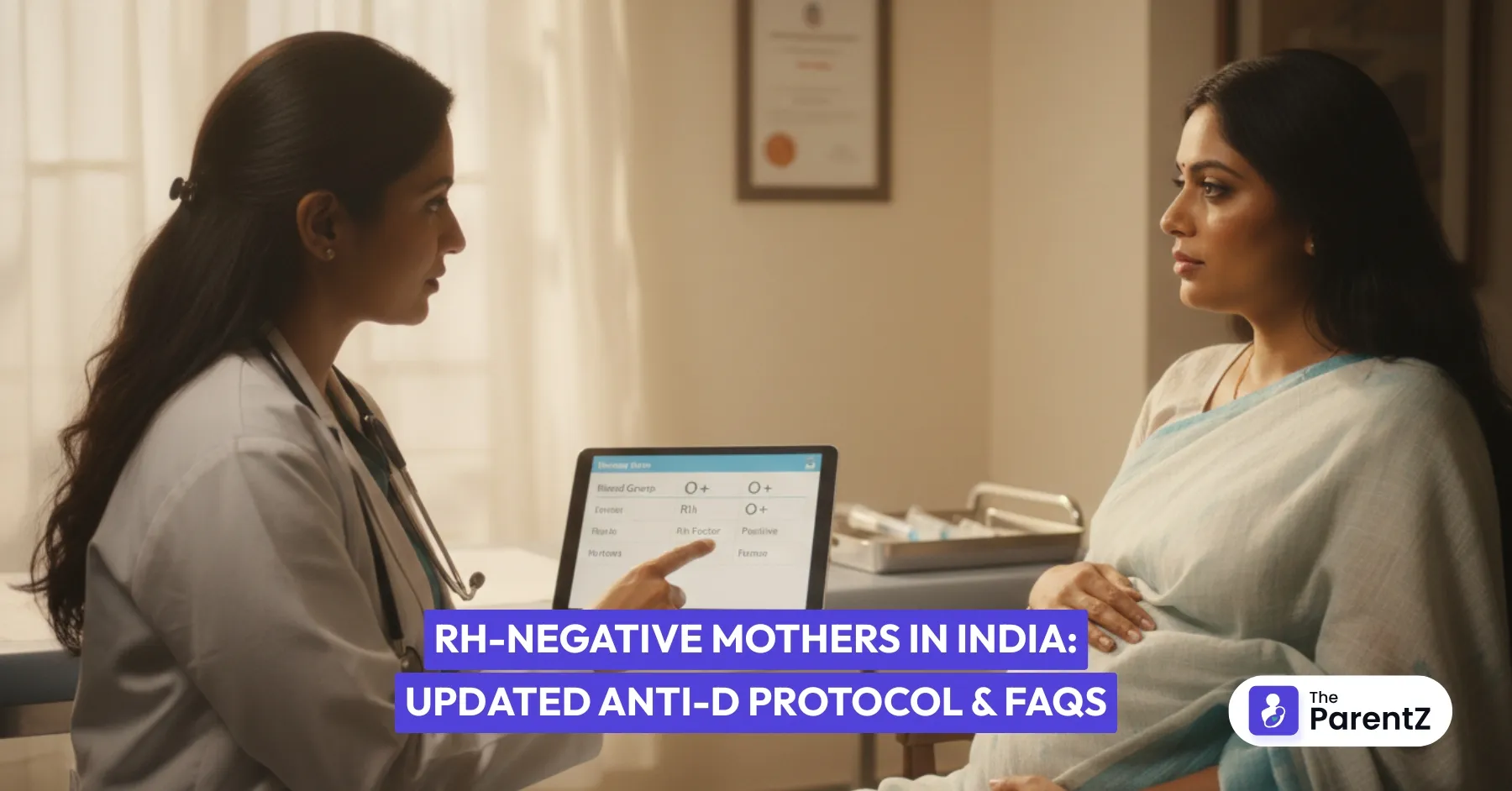If you are one of the 5-10% of Indian women who have Rh-negative blood, knowing how this impacts your pregnancy is important. The good news is that the condition is 98-99% preventable with proper treatment.
Sadly, recent research indicates that only around 50% of Indian pregnant women with Rh-negative blood get the important anti-D prophylaxis. This guide will assist you in understanding Rh-negative pregnancy India protocols, the full anti-D injection schedule, and address your most urgent questions according to the current FOGSI guidelines.
What is Rh-Negative Pregnancy?
A protein called the Rh factor, which is present on the surface of red blood cells, is part of your blood type. If this protein is present, you are Rh-positive; if not, you are Rh-negative. When a Rh-negative mother gives birth to a Rh-positive child (inherited from the father), complications may occur.
When the baby's blood mixes with yours, often during delivery or sometimes in pregnancy, your immune system might see the baby's Rh-positive cells as foreign. It then makes antibodies to attack these cells, called sensitization. Usually, this doesn't affect your first pregnancy, but future ones can be at risk.
Hemolytic Disease of the Fetus and Newborn (HDFN) can result from these antibodies attacking your baby's red blood cells if treatment is not received. Severe anemia, jaundice, kernicterus (brain damage), hydrops fetalis (fluid accumulation), or even stillbirth may result from this. However, you can lower this risk from 16% to just 0.18% with the proper anti-D injection schedule.
Understanding Rh Incompatibility in the Indian Context
Recent research from India and other parts of the country shows significant statistics regarding Rh-negative pregnancy in India:
About 5-10% of women in India are Rh-negative, with some regional differences—ranging from 2.9% to 6.1% in various hospital settings. Without preventive measures, around 10.7% of Rh-negative mothers can develop alloimmunization (an immune response to antigens present on blood cells).
Following an appropriate anti-D protocol, Rh incompatibility rates drop to 0.14–0.2%. About 89% of babies born to Rh-negative mothers are Rh-positive, making postpartum anti-D vital. In India, despite availability, only 48% who need it receive anti-D; 86.1% get it post-delivery, and just 12.3% receive the recommended antenatal dose.
Updated Anti-D Injection Schedule (FOGSI 2022 Guidelines)
It is important to know the anti-D injection schedule in order to safeguard your pregnancy. Here is the full protocol according to the revised FOGSI guidelines:
First Trimester Protocol (Before 20 Weeks)
Dosage: 150mcg (or 300mcg if 150mcg is unavailable)
Route: Intramuscular injection in the deltoid muscle
When Required:
- After a miscarriage or threatened abortion with bleeding
- Following medical termination of pregnancy (MTP)
- Following an ectopic pregnancy
- Post chorionic villus sampling (CVS) or amniocentesis
- Any vaginal bleeding episode
- Following abdominal trauma
Fetal blood cells may enter your circulation as a result of these, which is why they are referred to as "sensitizing events."
Second & Third Trimester Protocol (After 20 Weeks)
Routine Antenatal Anti-D Prophylaxis (RAADP): The most important dose in the prevention of Rh disease is the 300 mcg injection at 28 weeks of pregnancy. This must be administered to all Rh-negative women who are carrying potentially Rh-positive babies, irrespective of whether they've had no complications or bleeding.
For Sensitizing Events: In case you have any of the following after 20 weeks, you require an additional 300mcg dose within 72 hours:
- Vaginal bleeding or antepartum hemorrhage
- Abdominal trauma or injury
- Amniocentesis or other invasive procedures
- External cephalic version (turning a breech baby)
Postpartum Protocol
Your baby's cord blood will be tested within 72 hours of delivery. A 300 mcg anti-D injection is required for you if your child is Rh-positive. Although 72 hours is the ideal window, the injection can still offer some protection up to 10 days after delivery, though its efficacy will decline.
Quick Reference: Anti-D Injection Schedule
| Timing | Dose | When Required |
| Before 20 weeks | 150mcg (or 300mcg) | After miscarriage, MTP, ectopic pregnancy, bleeding, or invasive procedures |
| 28 weeks | 300mcg | Routine dose for all Rh-negative women |
| After 20 weeks | 300mcg | Within 72 hours of sensitizing events |
| After delivery | 300mcg | Within 72 hours if baby is Rh-positive |
How Anti-D Injection Works
Anti-D immunoglobulin can be thought of as your immune system's shield. The anti-D injection functions by eliminating fetal blood cells from your circulation before your immune system has a chance to identify them and produce antibodies.
In essence, passive immunity protects your baby from sensitization for a short time. Small amounts of anti-D immunoglobulin may pass through the placenta, but the developing fetus is unaffected. Any potential risks are greatly outweighed by the advantages.. It just offers protection for that particular pregnancy. You will require new anti-D dosages for every subsequent pregnancy because the effect is transient.
Who Needs Anti-D Prophylaxis?
You need anti-D if you are:
- Rh-negative and pregnant with an Rh-positive partner.
- Rh-negative with an unknown partner's blood type.
- Experiencing any sensitizing events mentioned above.
You don't need anti-D if:
- You're Rh-positive (most common).
- You're already sensitized (antibody test is positive—in this case, different management is needed).
- Both you and your partner are Rh-negative (baby will definitely be Rh-negative).
In the early stages of pregnancy, your doctor will do an indirect Coombs test to look for antibodies.
Warning Signs to Watch For
Contact your healthcare provider immediately if you experience :
- Any vaginal bleeding during pregnancy
- Abdominal trauma or injury
- Reduced fetal movements after 28 weeks of pregnancy
- Extreme headache, visual changes, or severe abdominal pain
- Signs of preterm labor
Early intervention can prevent complications of Rh negative pregnancy in India and ensure both you and your baby remain healthy.
Take Control of Your Rh-Negative Pregnancy
Rh disease can be prevented in 98-99% with the correct anti-D injection protocol. The importance lies in early detection by blood group testing at your initial antenatal checkup and following the FOGSI 2022 protocol to the letter.
Keep in mind that your best tools are information and prompt action. If your baby is Rh-positive, make sure you receive postpartum anti-D, adhere to your doctor's advice, and don't miss the 28-week injection. Your pregnancy journey doesn't have to be complicated by your Rh-negative status if you take the right care of it.
Use the ParentZ app to track your anti-D injection, pregnancy milestones, baby's progress, and appointments. Get advice and take control of prenatal care by downloading now.
Are you looking for more professional parenting advice and pregnancy advice? For in-depth articles on baby care, nutrition, child development milestones, and pregnancy health, visit The ParentZ.
FAQs
1. Is the anti-D injection safe for my baby?
Yes. It has a 98% success rate and has been used safely for over 50 years. It only prevents antibody formation in your bloodstream.
2. What are the side effects?
Most women have no side effects. Some may experience mild headaches, fever, injection site pain, or fatigue. Severe allergic reactions are rare. Inform your doctor if you have IgA deficiency.
3. Can I skip the 28-week injection if I've had no bleeding?
No. Fetal blood can cross into your circulation without visible symptoms. The 28-week dose is critical for protection against sensitization.
4. What if I miss the 72-hour window after delivery?
Contact your doctor immediately. The injection can still be given up to 10 days after delivery, though it's less effective over time.
5. Will this affect my future pregnancies?
Anti-D protects future pregnancies by preventing sensitization. Without it, complications increase with each pregnancy. You'll need new injections for each pregnancy.
6. Is anti-D available throughout India?
Yes, it's widely available in both public and private hospitals. Both plasma-derived and recombinant forms (like AntiD®) are distributed nationwide.
References:
- https://www.ijrcog.org/index.php/ijrcog/article/view/13336
- https://ijmpr.in/article/maternal-and-foetal-outcome-in-rh-negative-pregnancy-1083/
- https://www.sisuhospital.com/rh-negative-blood-and-pregnancy/
- https://www.rarediseaseadvisor.com/news/antenatal-anti-d-prophylaxis-pregnancy-india/
- https://biovoicenews.com/augmenting-women-health-fogsi-release-key-practice-points-for-use-of-anti-rh-immunoglobulin/
- https://www.fogsi.org/wp-content/uploads/2024/08/Binder_Routine-Antenatal-Care-for-the-Healthy-Pregnant-Women.pdf
- https://www.fogsi.org/wp-content/uploads/tog/anti-d-immunoglobulin-2022.pdf





Be the first one to comment on this story.